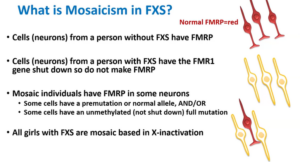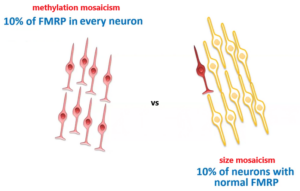with Dr. Elizabeth Berry-Kravis & Dr. Walter Kaufmann
The NFXF’s FORWARD study created the largest database of information on Fragile X syndrome (FXS) in the United States. 25 peer-reviewed journal publications have resulted from FORWARD data, and many more papers are being developed.
Recently, the American Journal of Medical Genetics Part A congratulated Fragile X researchers for authoring – not one – but TWO of their top 10 most-cited scientific papers. These papers were the result of FORWARD data. This is a major achievement and highlights the impact of Fragile X research within the community!
During this 45-minute Lunch & Learn webinar, Dr. Elizabeth Berry-Kravis and Dr. Walter Kaufmann presented on the following two “most-cited” publications and answered questions during a moderated Q&A:
- Mosaicism Type and Cognitive & Behavioral Functioning Among Males with FXS
- Sleep Problems in FXS: Cross-Sectional Analysis of a Large Cohort
Lunch & Learn Series: “Mosaicism Type and Cognitive & Behavioral Functioning Among Males with FXS” and “Sleep Problems in FXS: Cross-Sectional Analysis of a Large Cohort”
Additional resources and controls for this video are accessible just below the video: play/pause, volume, subtitles, view transcript, watch as picture-in-picture, or in full screen mode.
Discussion of Mosaicism Type and Cognitive & Behavioral Functioning Among Males with FXS
Dr. Elizabeth Berry-Kravis kicked off this webinar by presenting on the publication “Mosaicism Type and Cognitive & Behavioral Functioning Among Males with FXS”. Below are a few topics and take-aways discussed during the webinar.

- This study looked at mosaicism, which means an individual has several types of FX variations in different cells within their body. More over, this means that some cells actually produce FMRP.
- Most males with FXS make very little or no amount of FMRP, a protein that is important for brain development.
- This happens because the gene that makes this protein has been “turned off” in all of the cells in their body by a process called methylation.
- However, some males with FXS have what is called “methylation mosaicism” which means that some, though not all, of their cells have a gene that has not been turned off by methylation and can still make FMRP.
- This study only looked at males with FXS. The reason for this is because females have two X chromosomes, making data analysis more challenging.
- Types of mosaicism:
- Methylation mosaicism – FMRP production is “kind of shut down, but not fully shut down” so, cells don’t make as much FMRP as “normal” cells.
- Size mosaicism – some neurons with normal FMRP levels, most neurons with no FMRP

- In this study, participants with methylation mosaicism tended to have less severe intellectual disability and better social and functional skills.
- Methylation mosaicism was not associated with behavior or ASD diagnosis
- Data analysis supports the theory that a little FMRP in a high percent of cells (methylation mosaicism) may be much better than a lot of FMRP in a small percent of cells (size mosaicism).
- Understanding more about how FXS differs in people with and without methylation mosaicism may eventually help to guide expectations and treatment of individuals living with FXS.
- Future studies (if funded) will look further into methylation.
Discussion of Sleep Problems in FXS: Cross-Sectional Analysis of a Large Cohort
Dr. Walter Kaufmann then joined in to present on the publication “Sleep Problems in FXS: Cross-Sectional Analysis of a Large Cohort”. Below are a few topics and take-aways discussed during the webinar.
- This paper describes an overview of sleep difficulties in children living with FXS and their impact on families. Sleep difficulties have long been recognized as important symptoms in FXS, and recent studies, although small, have shown increased frequency of sleep problems in FXS. Thus, researchers set out to confirm this increase in frequency of sleep problems and to learn about the severity and impact of different sleeping problems.
- Some of the major findings included:
- Sleep problems tend to be more frequent in younger individuals.
- Some sleep problems, like problems falling asleep, being tired in the morning, and snoring loudly, are more frequent in males than in females.
- All sleep problems were associated with abnormal behavior, such as irritability/aggression and hyperactivity. Families reported that these behaviors have a negative impact.
- Major findings showed that sleep problems are prevalent in children with FXS and, although they tend to be mild, they are associated with behavioral problems that have negative impact on families.
- This was a cross-sectional study, meaning only one timepoint was looked at. Furthering this study, with a special focus on sleep apnea, is a crucial next step to see how this information changes over time.
- This study will be the base for updates on our Management Recommendations (updates coming soon!).
Learn More About the Panelists
Elizabeth Berry-Kravis, MD, PhD
Rush University Medical Center
Dr. Elizabeth Berry-Kravis is a neurologist and a Professor of Pediatrics, Neurological Sciences, and Biochemistry at Rush University Medical Center. She is also the Co-Director of the Molecular Diagnostics Section of the Genetic Laboratory. She established the Fragile X Clinic and Research Program in 1991, through which she provides care to over 700 patients with Fragile X Syndrome (FXS).
Walter Kaufmann, MD
Emory University School of Medicine
Dr. Walter Kaufmann is a neurologist and Adjunct Professor in the Department of Human Genetics at Emory University School of Medicine. He also serves as the Chief Scientific Officer at Anavex Life Sciences, a biopharmaceutical company. Dr. Kaufmann has over 20 years of experience in clinical research with a focus on developing novel therapies for genetic conditions associated with intellectual disability and neurologic disorders.
Additional Resources
We are excited to share information and resources on our website that was referenced during the webinar. We have included the link to additional resources and information below.
We recommend reviewing the following links for study Mosaicism Type and Cognitive & Behavioral Functioning Among Males with FXS:
We recommend reviewing the following links for study Sleep Problems in FXS: Cross-Sectional Analysis of a Large Cohort:
about

Anna De Sonia
Anna joined the NFXF team in 2024 as Director of Research Facilitation. She has many years of research experience, starting as a clinical research coordinator at Rush University Medical Center in Chicago in 2010. There she worked on a variety of clinical trials in the pediatric neurology division, specializing in Fragile X research. Anna earned her bachelor’s in psychology and is a certified clinical research coordinator (CCRC®) through the ACRP (Association of Clinical Research Professionals). She loves spending time with her dog, traveling and exploring new cultures, listening to music, and enjoying time with friends and family.

